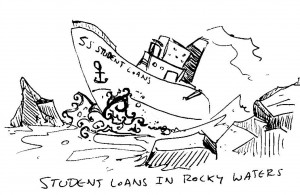A recent New York Times opinions piece by economist Paul Krugman addressed the Senate Republicans’ attempts to leave the Consumer Financial Protection Bureau toothless. As a result of Dodd-Frank, the Bureau was to be an agency independent of other regulatory agencies whose primary concerns are the banks. Republicans have threatened to filibuster the appointment of its director, Richard Cordray, and pursue legal action if President Obama doesn’t allow other regulators to veto its actions.
Though I tend to disagree with just about everything Krugman has to say, I agree that Republicans should leave the Bureau alone. The only reason I support the Bureau’s independence is because it currently directs a good percentage of its initiatives toward college students. It hasn’t had time to do much, but it recently sent out a survey asking for students’ input on student credit cards and bank accounts. It has also put up helpful materials on student loans on its website. I’m all for protecting students and assisting them in making smart financial choices, especially with the worsening situation most graduates are facing.
Total student loans now amount to over $1 trillion. What’s worse, the borrowing rate is twice what it was just a decade ago. In 2010, undergraduate students borrowed 63 percent more, on average, than undergraduates borrowed in 2000. If something isn’t done to curb this borrowing, then I fear America may experience another recession. You may dismiss that as speculation of someone who doesn’t study economics, but I remember the subprime crisis, and people are acting the same way they did before that bubble burst. I don’t like government intervention, but if it has to happen, I would rather have it happen before the economy collapses.
Credit cards are another tricky thing that I think the Bureau, if run properly, could make more manageable for students. Hidden fees, fine print, and cryptic penalty clauses make credit cards a hassle for anyone, but many students are new to this game, so a little extra help monitoring credit card companies on their behalf couldn’t hurt. Credit card companies recently gave retailers the option to impose checkout fees of up to four percent on customers. Bet most of you didn’t know that. What’s more important, though, is the reason for these fees. You see, Mastercard and Visa were found guilty of fixing the processing fees that they charge merchants, and therefore had to forgo collecting those fees for eight months. Well, now those eight months are up, and retailers are going to have to start paying again, placing a potential burden on the consumer. It is this sort of corrupt behavior that leads me to believe that a bureau addressing students’ concerns with regard to credit card companies and banks may not be such a bad thing.
The Obama administration has also been busy addressing the Perkins loan problem. This involves students defaulting on $964 million in Perkins loans in 2011 alone and then being sued by their respective colleges. Defaults have increased by 20 percent since 2006. Obama has crafted a proposal to help solve this problem though. The proposal, crafted alongside members of the President’s cabinet, entails handing dispensation and collection duties over to the Education Department instead of allowing schools to handle it — this will eliminate the lawsuits. The proposal would also increase the amount of Perkins loans available from $1 billion to $8.5 billion, which I do not agree with as it will only encourage more people to go into debt.
The Health Care and Education Reconciliation Act is also a step in the right direction. Under this, people who make their minimum student loan payments have any remaining debt forgiven after 20 years. Even the minimum payments won’t be as bad now since the Act limits payments to 10 percent of a debtor’s income. The government is smart to lower the minimum payments because the money that it is letting people keep each month can now be invested in legitimate companies, spent at stores or used to raise children (who will be the next generation of workers). This is all important for a healthy economy. In the end, the government will be better off under this new plan of lower payments and loan forgiveness because it will have collected more taxes by strengthening the economy. This act is a step in the right direction.
I understand that most of my conservative friends probably disagree with me on the issue of expanding government regulation, but to put it bluntly, I don’t trust people. The Consumer Financial Protection Bureau would both monitor corrupt individuals and helps those who are not financially savvy, so I cannot support killing it in the Senate. The government has to focus on limiting the amount of debt students incur while obtaining an education, or it will lose in the long run.
Ondo is a member of the class of 2014.



